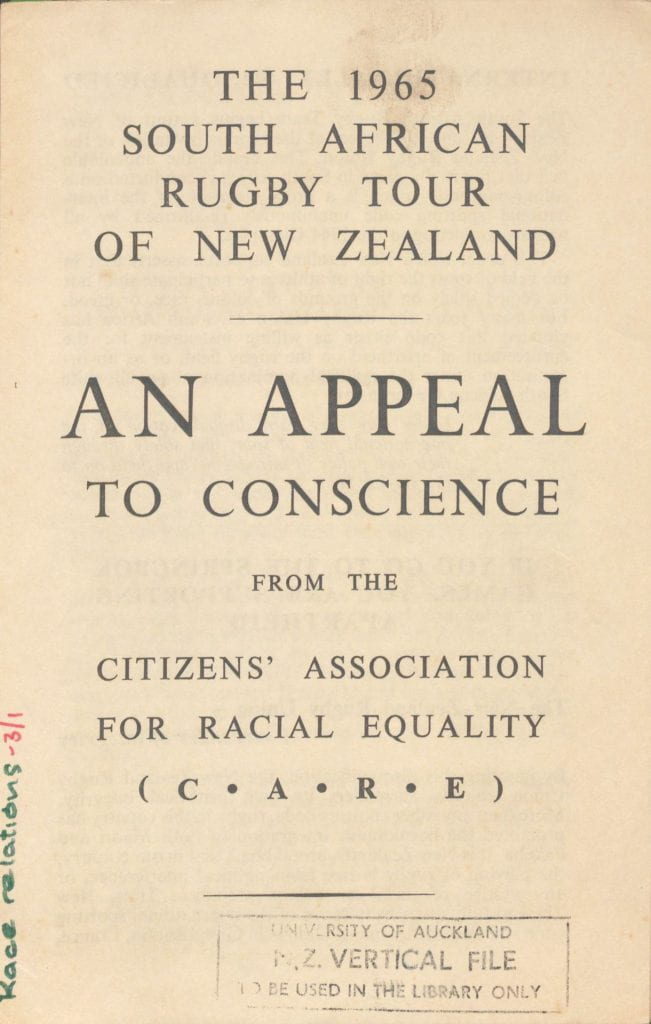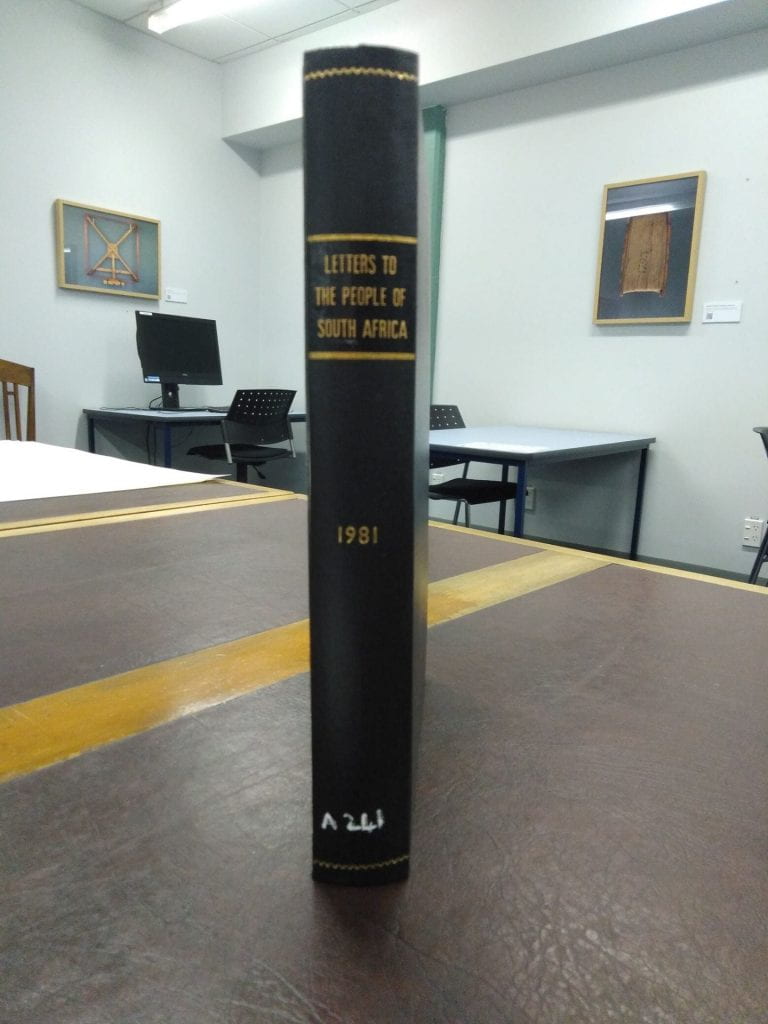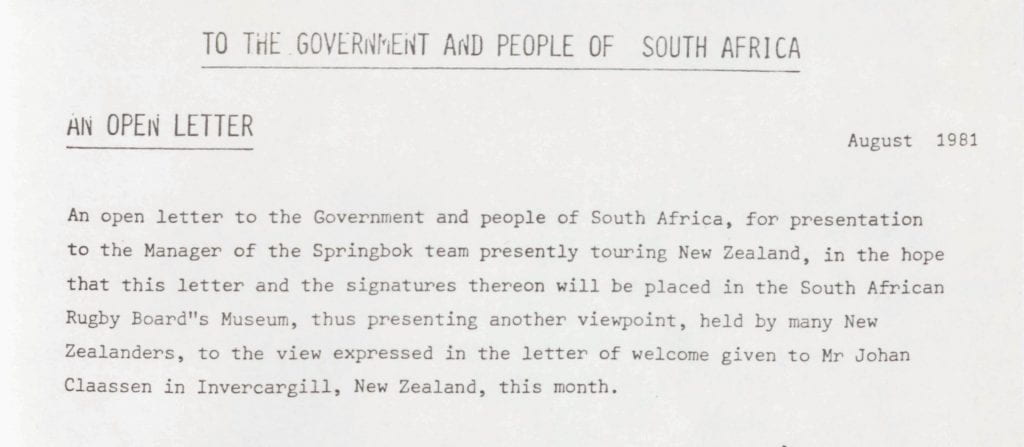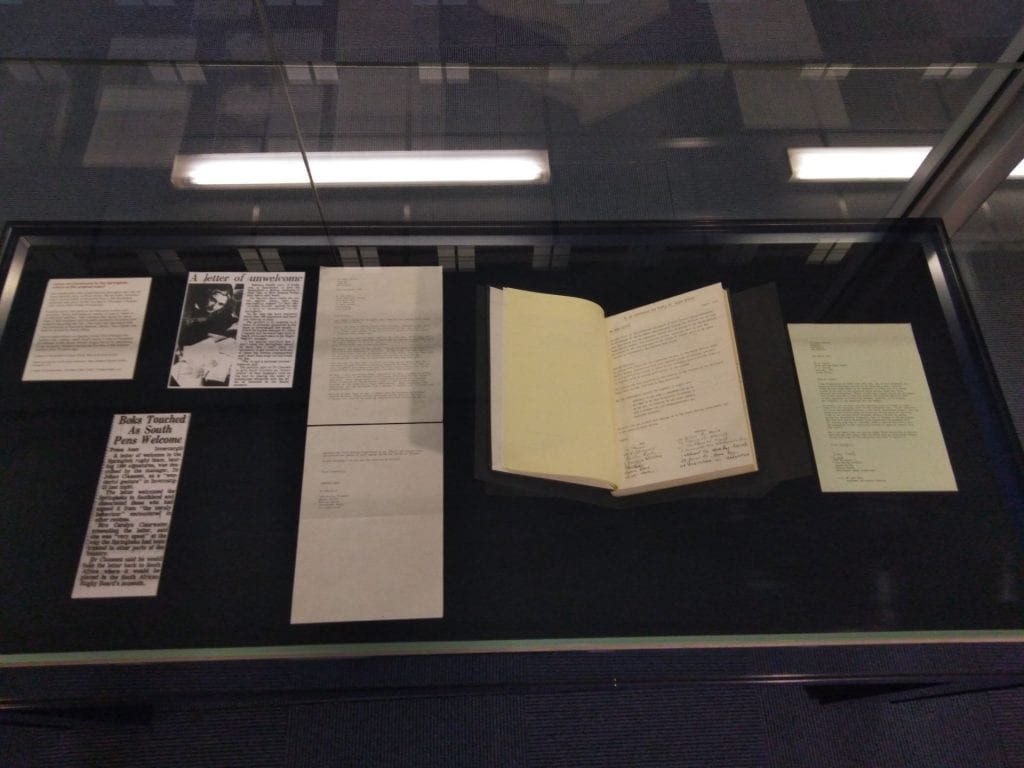By Ian Brailsford
The fortieth anniversary of the 1981 Springbok tour has prompted several New Zealand museums, galleries, and libraries to organise commemorative displays, public talks, and film screenings to mark the event and the University of Auckland’s Special Collections is no exception.
Initial searches within our published and archival collections revealed active collecting by the General Library in its ‘vertical file’ of ephemera on the topic of sporting contacts with South Africa from the early 1960s onwards. Printed materials from groups such as the National Anti-Apartheid Committee, CARE (Citizens’ Association for Racial Equality) and HART (Halt All Racist Tours) had been preserved in the vertical file under the heading ‘Race relations’. For example, we located this 1965 CARE pamphlet opposing that year’s Springbok tour to New Zealand in addition to many items chronicling opposition to the 1970 and 1976 All Blacks tours to South Africa. We lacked, however, historic materials documenting either support for the tours or arguing that sport and politics should be kept at arm’s length. In effect, a Springbok display meant an ‘opposition to the tour’ display.

1965 CARE pamphlet, General ephemera collection, MSS & Archives 2015/23, Special Collections, University of Auckland Libraries and Learning Services.
With only three display cases to work with, however, we decided that although the 1981 tour was part of a longer history of anti-apartheid organising in New Zealand we would focus on the autumn, winter, and early spring of 1981.
With our extensive holdings relating to the University of Auckland we expected to find items that would speak to a student audience. In our university photography collection, we found a black and white print of two students, Sara Noble and Kevin Hague, in the Student Union ‘Quad’ staging a hunger strike against the tour in a ‘Bantu hut’ constructed of wood and corrugated iron. We located the photo in the New Zealand Herald which ran with the story of the protest on 29 April and included this in the display.[1]
The Springbok tour dominated the pages of the student association weekly newspaper Craccum during 1981. The Craccum issue following the final test match at Eden Park on 12 September, for instance, featured a four-page photo montage ‘Tour souvenir lift out’.[2]
However, the one time a vote was held on campus among the student body relating to the tour, in August 1981, a small majority of students (1740 to 1735) voted against a motion proposing that student association funds be allocated to pay for anti-tour activities.[3] While the tour is sometimes seen as a generational divide, the fact that a significant number of University of Auckland students opposed funding anti-tour ventures indicates it was more nuanced than this.
The centrepiece of our display is an archival item, the story of which teases out some of the complexities surrounding the tour. The General Library in February 1982 received a copy of an anti-tour ‘letter of unwelcome’ petition for depositing in the archives. It’s a hardbound copy of the petition catalogued as MSS & Archives A-241, with the snappy title ‘Letters to the people of South Africa from citizens of Auckland and citizens of Dunedin to the South African Rugby Board Museum’.

Bound copy anti-tour petition, MSS & Archives A-213, Special Collections, University of Auckland Libraries and Learning Services.
The origin of the petition was a letter of welcome to the Springbok touring party when they arrived in Invercargill for a match against Southland on Saturday 8 August. Over 1,300 Southland residents had signed the letter and Springbok tour manger, Dr Johan Claassen, promised to preserve it in the Rugby Board’s museum when he returned home to South Africa. The New Zealand Herald quoted Southland resident Carolyn Springwater, who handed over the letter to the team, as being ‘very upset’ by the way the Springbok tourists had been treated in other parts of New Zealand.[4] Here was archival evidence of New Zealanders who supported the tour but one that had (most likely) gone offshore.
Our ‘letter of unwelcome’ petition was a direct response to the Southland welcome letter. The petition was started in mid-August by Remuera mother and daughter Jenny and Rebecca Hanify, as a ‘personal protest’ against the tour. They wanted to create a lasting memento to sit alongside the Southland letter in the Rugby Board museum. In total more than 3,500 Auckland and Dunedin residents signed in one month. Two of the first signatures were the former Auckland Mayor Dove-Myer Robinson and incumbent Colin Kay. Rebecca Hanify was quoted in the Auckland Star saying that she was against apartheid, but she didn’t, ‘think it’s necessary to get involved with any of these big protest organizations and I don’t want to go out and break the law’.[5]

Opening text of anti-tour petition, MSS & Archives A-213, Special Collections, University of Auckland Libraries and Learning Services.
The original copy of the petition was mailed to South Africa in September 1981. A further letter in our collection from March 1982 indicates that it reached South Africa, but the South African Rugby Board refused to accept it. If the original is lost, then our copy of the petition is the only one left.
Tantalisingly, the Springbok Experience Rugby Museum in Cape Town closed in 2019, so tracking down whatever happened to both letters – welcome from Southland and unwelcome from Auckland and Dunedin – is proving difficult. We have the hope that displaying the item, writing about it on the library’s website and on this blog might trigger someone’s memory. We would also like to hear from the Hanify family so they can revisit their contribution to our collective memories of the 1981 Springbok tour.

Display case featuring petition and associated items.
[1]‘Hunger as tour protest’, New Zealand Herald, 29 April 1981, p.16.
[2]‘Tour souvenir liftout’, Craccum, Vol. 55, No. 21, 15 September 1981, pp.11-14.
[3]‘No one wins’, Craccum, Vol. 55, No. 20, 8 September 1981, p.4.
[4]‘Boks touched as south pens welcome’, New Zealand Herald, 8 August 1981, p.3.
[5]‘A letter of unwelcome’, Auckland Star, 9 September 1981, p.3
